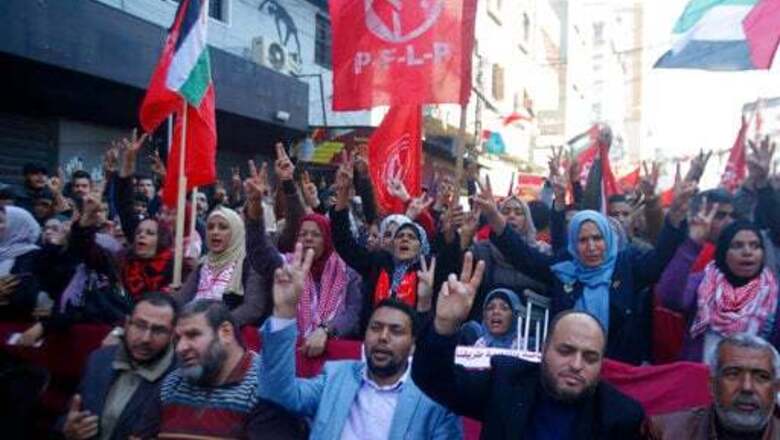
views
JERUSALEM: A Spanish woman admitted Wednesday under a plea bargain reached in an Israeli military court that she raised large sums of money that were diverted to a banned militant group, the Popular Front for the Liberation of Palestine.
Israel seized on the conviction as proof that it was justified in branding six Palestinian civil society organizations as terrorist groups last month. But the Popular Front for the Liberation of Palestine is a separate group, court documents suggest the woman knew little about the scheme and she was not implicated in any militant activities by the PFLP.
Israel, along with the U.S. and European Union, consider the group to be a terrorist organization.
Juana Ruiz Snchez, a Spanish citizen who lives in the occupied West Bank and is married to a Palestinian, was a longtime worker for Health Work Committees, a Palestinian nonprofit group that provides medical services in the occupied West Bank.
According to legal documents obtained by The Associated Press, Ruiz raised hundreds of thousands of dollars for the group, some of which was diverted to the PFLP.
But she appeared to have been largely unaware of her involvement in the alleged PFLP fund-raising scheme. In one case, for example, it said she raised some $4,000 for what she thought was medical equipment by presenting donors paperwork that she did not know was fraudulent. The funds were then diverted to the PFLP, according to the document.
This whole time I thought that I was working for a health, medical organization, she was quoted as telling the court. “I am very sorry, I simply erred and I want you to take into account that I never wanted to do any injustice to anyone.
But prosecutors noted she continued her work for the Health Work Committees even after learning a co-worker had helped finance an attack and after Israel declared the organization illegal in early 2020.
In doing so, the defendant worked for the organization and thus performed a service for the PFLP, the document said.
She was convicted of performing a service for an outlawed organization and illegal money transfers into the West Bank.
Israeli officials, referring to her by her married name of Juana Rishmawi, said the decision marked a victory in their war against the PFLP. Israel has targeted what it says is the groups efforts to raise funds from Western donors under the guise of humanitarian work.
The entire international community must work together with Israel to prevent terrorist organizations from operating in civilian frameworks and to prevent funds from reaching terrorist organizations, said Foreign Minister Yair Lapid.
Ruizs lawyer, prominent Israeli defense attorney Avigdor Feldman, called the governments case very weak. He said his client, who is in her 60s and has been in prison since April, had admitted to watered-down charges in order to go free.
The conviction includes a 13-month prison term and $16,500 fine. But with credit for time served and other reductions, she could be released in two weeks, Feldman said.
That was our main reason to come to the plea bargain, he said. The initial charges, he said, were very grave and could have resulted in years in prison.
In the end, they are charging her only that she should have known that the Popular Front was working behind the organization. Thats it, he said.
She is to be sentenced Nov. 17.
Last month, Israel designated six Palestinian civil society organizations as terrorist groups, saying they were tied to the PFLP, a secular, leftist political movement with an armed wing that has carried out deadly attacks against Israelis. But Israel has yet to take further action against the groups, which operate openly in the occupied West Bank.
The six groups, some of which have close ties to rights groups in Israel and abroad, deny the allegations. They say the terror designation is aimed at muzzling critics of Israels half-century military occupation of territories the Palestinians want for their future state.
The Health Works Committees was banned earlier and is seen as a test case for Israeli efforts against the other six.
A confidential Israeli dossier detailing alleged links between the groups and the PFLP contains little concrete evidence and relies almost entirely on the interrogations of two former workers at the Health Works Committees.
Ayed Abu Eqtaish, accountability program director in Defense for Children International-Palestine, one of the six groups, rejected the plea bargain.
The decision taken by the Israeli government is political and aims to silence institutions and prevent them from playing their role in exposing the practices of the occupation in the occupied territories, he said.
The Spanish government, which provided consular assistance to Ruiz during the trial, has said it has controls to prevent aid money from reaching militant groups. There was no immediate reaction to the plea bargain from the Spanish Foreign Ministry.
___
Associated Press writer Ilan Ben Zion contributed to this report.
Disclaimer: This post has been auto-published from an agency feed without any modifications to the text and has not been reviewed by an editor
Read all the Latest News here




















Comments
0 comment